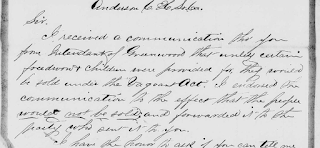Recently, well actually it was back at the end of May, I was wanting to find out more about my southern family that came from Greenville, South Carolina. I have all their dates for birth, marriage and death but it seemed so stark. What was the rest of their story?
I decided to take a stab at some records that I had previously overlooked, the record of the Freedmen's Bureau. But first I need to understand what was the purpose of the bureau. On www.Civilwarhome.com I found an article,"Freedman, The Freed Slaves of the Civil War". The article gives a brief history and explanation of this short lived bureau. The bureau was first conceived in 1863 and finally acted on by Congress in 1865. The war department in response to the Confiscation Act of 1862 felt there was a need to help the newly freed slaves become self-reliant. It's main purpose was to provide an education and provisions such as food, clothing and fuel. The funding for all this was to come from the Department of War. But it was also required to resolve disputes between the white employers and the newly freed men demanding fair wages. Surprisingly it was to last only one year.
While browsing the records on Familysearch.org for Freedmen's Bureau, I came across a letter to the local agent for the Abbeville District in South Carolina. It clearly denotes the exact portions of what the provisions are to be for adults and children and how often.
Reading on, the next letter had the term Vagrant Act.
In a nutshell, it appears if newly freed slaves were found not to be providing for his or her family, or were found to be gambling, peddling without a license or if their behavior could be considered disorderly they could be arrested, tried and sentenced to hard labor. Remember, the jury would have been the free white males, the very plantation owners they had just left. Can you imagine the resentment these men would have toward their former slaves or any other person of color?
I started out looking for anything that might tell me more about my family from South Carolina and ended up learning more about the prevailing attitudes and unfairness that existed after the Civil War. To understand who our ancestors were, how they may have thought and the issues they dealt with every, family historian/genealogist must understand the laws and records of the past. Genealogy is more than dates and names. Genealogy is a search for the joys, the grief, the triumphs, the struggles, the disappointments, the fairness and yes the unfairness that comes with every day life.
Thank you Judy for your help and insight.
I started out looking for anything that might tell me more about my family from South Carolina and ended up learning more about the prevailing attitudes and unfairness that existed after the Civil War. To understand who our ancestors were, how they may have thought and the issues they dealt with every, family historian/genealogist must understand the laws and records of the past. Genealogy is more than dates and names. Genealogy is a search for the joys, the grief, the triumphs, the struggles, the disappointments, the fairness and yes the unfairness that comes with every day life.
Thank you Judy for your help and insight.


What a wonderful lesson! I had ancestors who owned a few slaves in Tennessee. I've never thought about seeing what the laws were like after the slaves were freed. I'll have to look into this! Thanks for sharing!
ReplyDelete